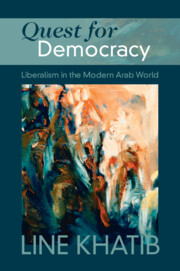‘Contesting common convictions that perceive Arab liberalism as an imported colonial legacy, Line Khatib presents a sophisticated analysis of liberal ideas and their transformation in Egypt and Syria. She resituates Arab liberalism in the understanding of historical scholarship, which is currently dominated by the clash between the autocratic Arab states and Islamism.’
Wael Abu-‘Uksa - The Hebrew University of Jerusalem
‘An excellent, meticulous defence of indigenous Arab liberalism. Khatib forcefully deconstructs the hegemonic narrative that Arabs have been trapped by authoritarian states and militant Islamism, shining light on the struggle of courageous liberal activists for human rights, democracy, and social justice. This book insists that ‘hope is not dead’ for a liberal future in the Middle East.’
Israel Gershoni - Tel Aviv University
‘At a time of resurgent authoritarianism in the region, this pathbreaking and much-needed book shows the deep historical roots of liberal political thought and practice in Egypt and Syria. The rich evidence from the 19th century speaks against those who dismiss the possibility of Arab liberal democracy today.’
Sune Haugbolle - Roskilde University
‘Line Khatib shows that the Arab Spring was no flash in the pan - the 2011 uprisings were the latest links in a long and durable chain of Arab liberal struggle reaching back to the 19th century. Make no mistake: the roots of Arab democracy are deep and they will burst forth in protest again.’
Elizabeth F. Thompson - American University
‘Her work is truly imaginative as it shows how liberal movements evolved across generations … Most Western readers will find the names and movements Khatib documents as unfamiliar. While the region is known for illiberalism, most Western intellectuals know about Arab liberalism. However, few know much more than they have a political presence. Khatib removes the veil through a detailed history.’
Justin Kempf
Source: Democracy Paradox blog (https://democracyparadox.com)
'Recommended.'
M. D. Crosston
Source: Choice



